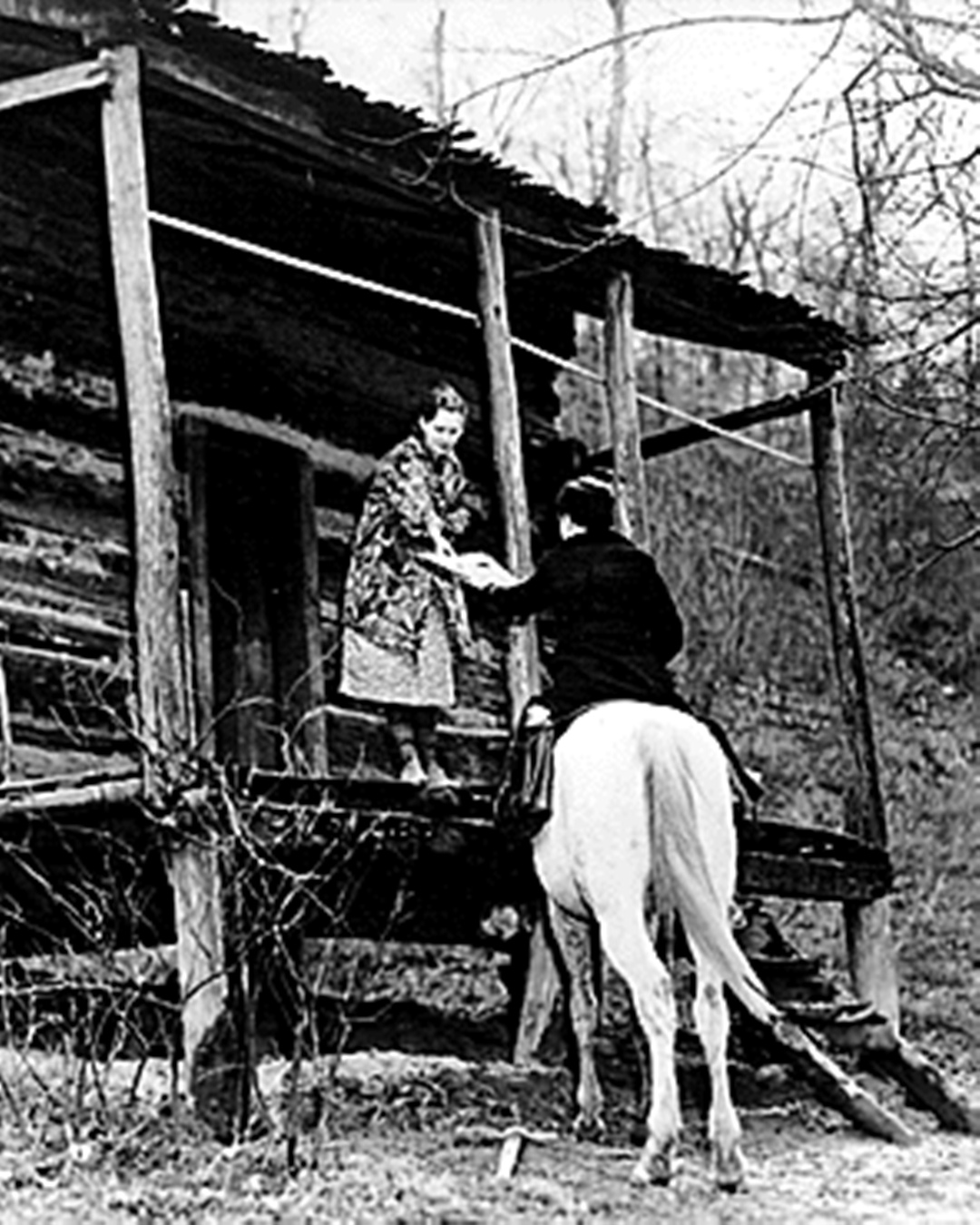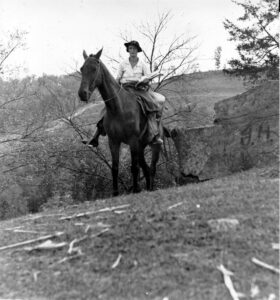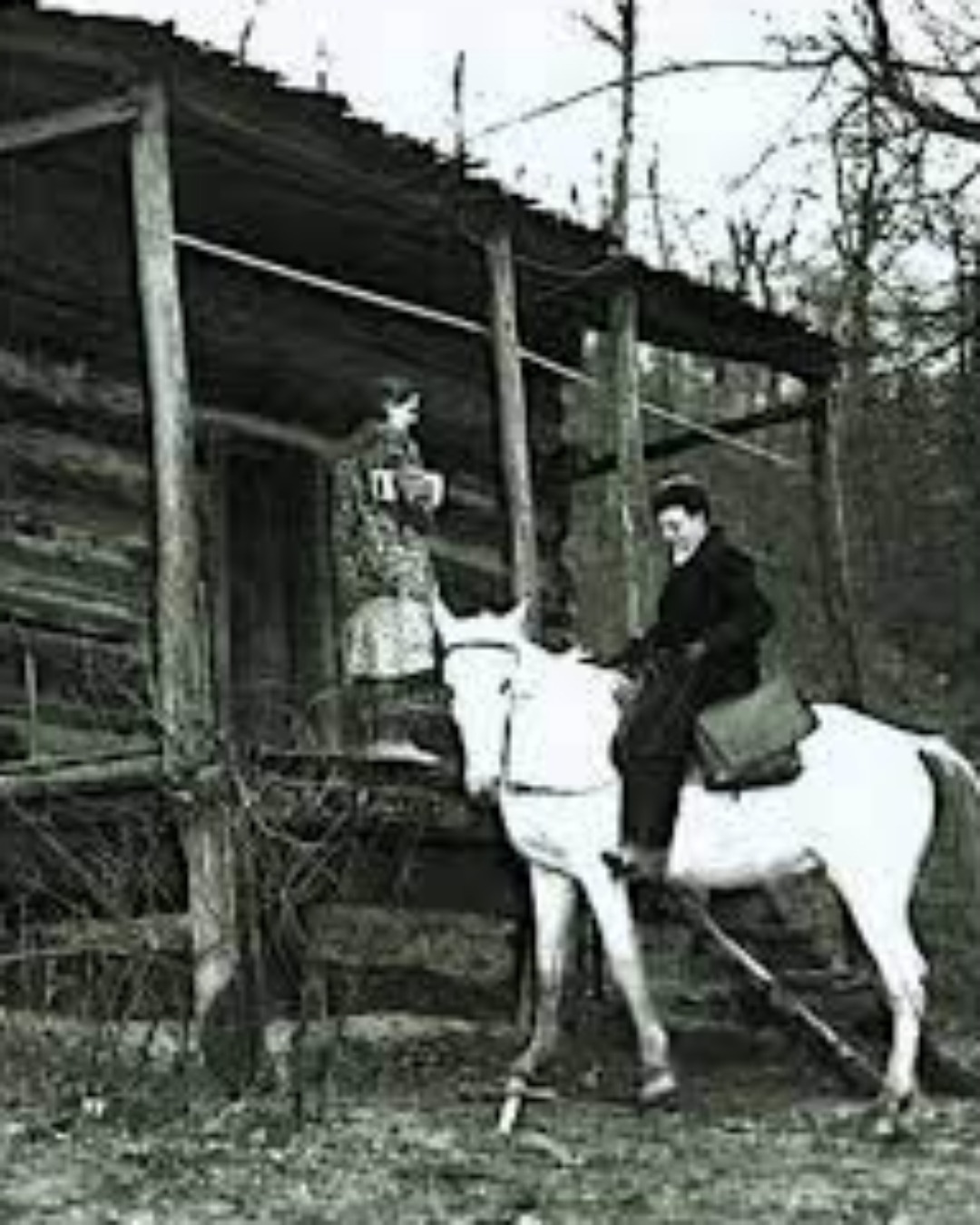In the autumn of 1935, when the Appalachian hills were wrapped in morning mist, a young girl named Eliza waited barefoot on her family’s wooden porch. Her home sat deep in a valley where the nearest town was many miles away, and her family lived from one uncertain season to the next. Yet every few weeks, she listened for a familiar rhythm—the steady clop of hooves echoing up the narrow trail.
It was the sound of a woman on horseback, carrying two large canvas saddlebags filled with books. To Eliza, it was the sound of possibility.
This scene played out across countless mountain hollows during one of the most difficult periods in American history. It formed the heart of a remarkable chapter that blended courage, community, and the enduring power of stories.

The Birth of a Quiet Revolution
During the Great Depression, much of rural Appalachia was cut off from educational resources. Families cared deeply about learning, yet libraries were miles away, and travel was often difficult. Recognizing this challenge, the Works Progress Administration introduced an innovative and compassionate project: the Pack Horse Library Program.
These riders became known as the Book Women, though men occasionally joined as well. They were mothers, daughters, and neighbors who believed that knowledge could travel any distance if someone was willing to carry it.
Each week they rode between 100 and 200 miles across rugged terrain. Their saddlebags held dog-eared novels, homemade recipe books, children’s stories, craft guides, magazines, and weather-worn almanacs. Families treated these books with care, often returning them repaired, re-stitched, or wrapped in cloth so they would last longer.
Their journeys were not dramatic in the way legends sometimes imagine, but they were undeniably demanding. They crossed narrow ridgelines and winding creek beds, sometimes moving slowly through seasonal storms. Still, the focus remained steady: bringing information and imagination to people who needed both.
The Cultural Significance of the Book Women
Communities soon came to see the Book Women as symbols of connection and encouragement. Their role became part of local stories, passed down in gentle retellings that highlighted perseverance rather than hardship.
In some households, their visits marked the most anticipated moments of the month. Children hurried to return books so they could borrow new ones. Adults traded novels or shared handwritten collections of family remedies, folk stories, and recipes that the librarians sometimes added to their routes. Over time, these exchanges created a shared cultural memory in which the riders represented more than education—they represented unity.
Folklore often embeds these women with almost mythical warmth. While their work was real and practical, local storytellers sometimes describe them as figures who carried “light” into the hills. This is understood today as symbolic language that speaks to emotional impact rather than literal events. The Book Women offered comfort and connection at a time when people sought any reminder that better days could return.
Their legacy remains woven into Appalachian identity. Museums, oral histories, and community festivals still celebrate the program, honoring both the riders and the families who welcomed them.
The Science Behind Why Stories Bring Hope
Beyond the cultural meaning, modern research helps explain why the work of the Pack Horse Librarians had such a profound effect.
Stories Strengthen Emotional Well-Being
Psychologists have long suggested that reading can support emotional resilience. Books allow readers to imagine different outcomes, empathize with characters, and experience a sense of escape that feels peaceful rather than overwhelming. Families in the 1930s described stories as offering calm during uncertain times—a sentiment modern studies echo.
Reading Stimulates Brain Connectivity
Neuroscientists have found that reading activates regions of the brain linked to memory, problem-solving, and creativity. When Appalachian families practiced reading regularly, they weren’t simply passing the time. They were strengthening cognitive pathways that help people adapt to change.
Shared Stories Build Community
Sociologists note that reading within families or neighborhoods fosters social bonds. In Appalachian communities, the arrival of a Book Woman often became a shared moment. Neighbors discussed books and passed them along, creating a network of communication and encouragement. These social connections played an important role in strengthening community spirit.
Information Inspires Practical Innovation
Some materials delivered by the Book Women were instructional, such as home guides, craft manuals, or weather information. Access to such content supported everyday problem-solving. Whether a family used a new recipe, adjusted planting plans based on an almanac, or taught children letters from a borrowed primer, information helped them adapt with confidence.
The Riders Themselves: Quiet Leaders of Their Time
Among the many librarians who served, individuals like Mary Carson (a name recorded in local accounts and retellings) became symbolic of dedication. She traveled long routes with her mule, Old Joe, maintaining her schedule even during seasonal challenges. Her determination reflected a broader reality: these librarians were community leaders who understood the value of every book they delivered.
The riders were not seeking fame or recognition. Many described their work simply as something that needed to be done. Their purpose was to make sure that families in remote places felt supported and included.
A Program That Ended, But a Legacy That Grew
The Pack Horse Library Program operated until the early 1940s, when national priorities shifted and funding went toward new public efforts. Although the program concluded, its influence endured through generations.
The reading habits it encouraged continued to shape families. Many who grew up with borrowed books later became teachers, writers, and community organizers. Others passed down stories of the Book Women as lessons in generosity and perseverance.
In recent years, documentaries, articles, and historical features have revisited this chapter of American history. These works highlight not only the librarians’ travels but also the communities that welcomed them and contributed to the evolving collection of materials. The result is a deeper appreciation for grassroots efforts that quietly transform lives.

Why Their Story Still Captures the Public Imagination
Today, the tale of the Pack Horse Librarians resonates for several reasons.
Their Work Blended Practicality and Inspiration
The riders delivered books because communities needed them, yet their journeys also stirred emotional meaning. They proved that support can come in simple forms—such as a story shared between neighbors.
They Represent the Power of Everyday People
The Book Women were not wealthy or politically influential. They were regular individuals who cared deeply about education. Their efforts show how ordinary people can create extraordinary impact through consistent, compassionate action.
Their Legacy Aligns With Modern Curiosity About Community Support
In an age when people are rediscovering the value of connection and shared learning, the story of these riders feels especially relevant. It reminds us that knowledge is most powerful when it is accessible to everyone.
Their Contribution Shows the Universal Need for Learning
Across cultures and centuries, reading has been viewed as a gateway to personal development. The Pack Horse Library Program echoes a truth observed in many societies: communities thrive when information flows freely.
Reflection: What the Pack Horse Librarians Teach Us Today
As we look back on the riders moving through fog-covered hills, their saddlebags filled with books of every shape and size, we see a portrait of resilience rooted in kindness. Their story encourages us to imagine what can happen when people choose to share resources, support one another, and believe in the transformative power of knowledge.
Though the world has changed, the importance of curiosity remains. Every book, article, and shared story continues the tradition they helped build. And each time someone opens a book to learn something new, a small part of their legacy lives on.
Sources
daily.tiemgo.vn
The Women Who Rode Through the Depression Carrying Hope in Saddlebags – Daily News
NKyTribune Archives on Pack Horse Library History
